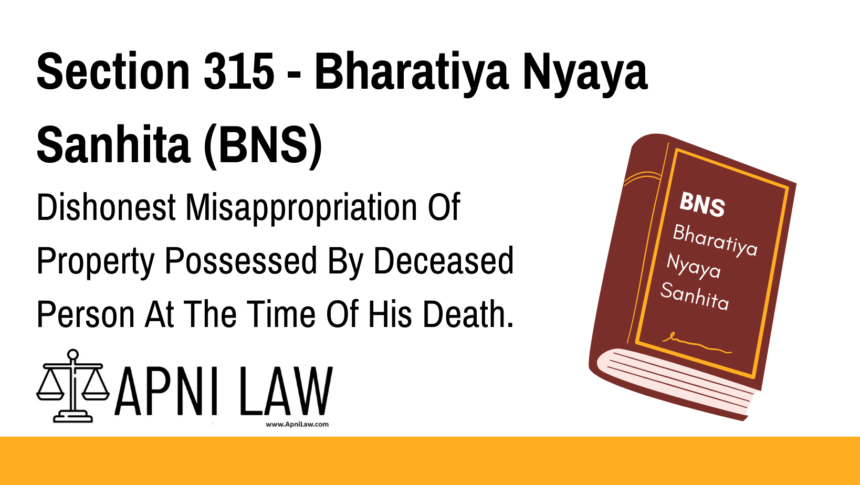Code: Section 315 BNS
Dishonest Misappropriation of Property Possessed by Deceased Person
Whoever dishonestly misappropriates or converts to his own use any property,
knowing that such property was in the possession of a deceased person at the time of that
person’s decease, and has not since been in the possession of any person legally entitled to
such possession, shall be punished with imprisonment of either description for a term which
may extend to three years, and shall also be liable to fine, and if the offender at the time of
such person’s decease was employed by him as a clerk or servant, the imprisonment may
extend to seven years.
Illustration.
Z dies in possession of furniture and money. His servant A, before the money comes
into the possession of any person entitled to such possession, dishonestly misappropriates
it. A has committed the offence defined in this section.
Explanation of Section 315 BNS
Section 315 of the Bharatiya Nyaya Sanhita (BNS) deals with the crime of dishonest misappropriation or conversion of property that was in the possession of a deceased person at the time of their death. This provision is applicable when:
- The property is still in the possession of the offender, without having been legally transferred to someone entitled to it.
- The offender knows that the property belonged to a deceased person and was not in the possession of anyone legally entitled to it after the person’s death.
The law imposes stricter punishment if the offender was employed as a clerk or servant of the deceased person at the time of the offence, reflecting a breach of trust.
Illustration
Example 1: Misappropriation by a Servant
Z dies in possession of furniture and money. His servant, A, dishonestly misappropriates the money before it can be legally transferred to any entitled person.
In this case, A has committed an offence under Section 315 of the BNS.
Example 2: Misappropriation by an Unknown Person
B finds a bag containing valuable items that belonged to C, who recently passed away. B knows that the items belonged to a deceased person and keeps them without attempting to return them to the legal heirs.
B is liable under Section 315 for dishonest misappropriation.
Common Questions and Answers on Section 315 BNS
1. What does Section 315 BNS cover?
- Answer: It covers the dishonest misappropriation of property belonging to a deceased person, where the property has not been legally transferred to anyone entitled to it.
2. What is the punishment under Section 315?
- Answer: The offender may face up to three years of imprisonment, a fine, or both. If the offender was a clerk or servant of the deceased, the imprisonment may extend to seven years.
3. Does this section apply if the property is already in the possession of legal heirs?
- Answer: No, Section 315 applies only if the property has not been legally transferred to any person entitled to it after the deceased’s death.
4. Is the offender’s knowledge of the property’s status important?
- Answer: Yes, the offender must know that the property belonged to a deceased person and that no one legally entitled has taken possession of it.
Conclusion
Section 315 of the BNS ensures the protection of a deceased person’s property from dishonest misappropriation. It holds individuals accountable for exploiting the vulnerable situation after someone’s death, especially when they abuse a position of trust, such as a servant or clerk.








